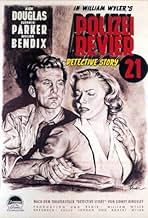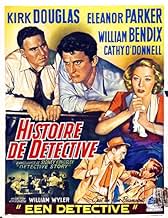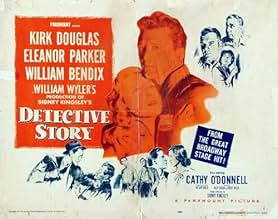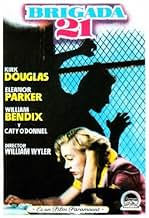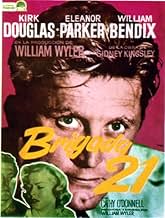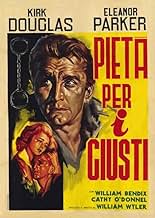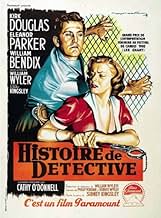IMDb RATING
7.5/10
10K
YOUR RATING
On one day in the 21st Precinct squad room, assorted characters form a backdrop for the troubles of hard-nosed Detective Jim McLeod.On one day in the 21st Precinct squad room, assorted characters form a backdrop for the troubles of hard-nosed Detective Jim McLeod.On one day in the 21st Precinct squad room, assorted characters form a backdrop for the troubles of hard-nosed Detective Jim McLeod.
- Director
- Writers
- Stars
- Nominated for 4 Oscars
- 7 wins & 11 nominations total
William 'Bill' Phillips
- Det. Pat Callahan
- (as William 'Bill' Phillips)
- Director
- Writers
- All cast & crew
- Production, box office & more at IMDbPro
Featured reviews
Adapted from a stage play by Sidney Kingsley, "Detective Story" depicts a day at a New York police precinct in the early 1950's. The film resembles a feature-length episode of "Barney Miller" without the jokes as the detectives bring various shoplifters, petty thieves, and embezzlers into the station for booking. However, the film does not lack humor as a broad hammy performance by Joseph Wiseman and an only slightly subtler take on a Brooklynese shoplifter by Lee Grant lighten up the often heavily dramatic proceedings.
The central character, Detective Jim McLeod, is an unforgiving, by-the-book veteran, who sees the world in black and white, good versus evil, with no shades of gray in between. Kirk Douglas brings McLeod to life in one of his finest, most powerful performances. Douglas's Oscar-caliber work is matched by a fragile, deeply felt performance by Eleanor Parker as McLeod's wife, who harbors a secret from her past that, unknown to either McLeod or his wife, connects back to an on-going police case. The scenes between Douglas and Parker are among the best in the film.
Veteran director William Wyler retains most of the play's action in the central precinct room and only occasionally breaks from the claustrophobic set for a breather. Lee Garmes photographed "Detective Story" in crisp black and white, and some of the shots of New York City could be framed and hung on a wall. With a cast of top character players that includes Gladys George, William Bendix, Frank Faylen, and George Macready, the multi-character, multi-plotted "Detective Story" is a powerful, well-acted film that somehow is less often seen than its quality warrants.
The central character, Detective Jim McLeod, is an unforgiving, by-the-book veteran, who sees the world in black and white, good versus evil, with no shades of gray in between. Kirk Douglas brings McLeod to life in one of his finest, most powerful performances. Douglas's Oscar-caliber work is matched by a fragile, deeply felt performance by Eleanor Parker as McLeod's wife, who harbors a secret from her past that, unknown to either McLeod or his wife, connects back to an on-going police case. The scenes between Douglas and Parker are among the best in the film.
Veteran director William Wyler retains most of the play's action in the central precinct room and only occasionally breaks from the claustrophobic set for a breather. Lee Garmes photographed "Detective Story" in crisp black and white, and some of the shots of New York City could be framed and hung on a wall. With a cast of top character players that includes Gladys George, William Bendix, Frank Faylen, and George Macready, the multi-character, multi-plotted "Detective Story" is a powerful, well-acted film that somehow is less often seen than its quality warrants.
This top-notch police story rises far above the norm for its type. A true example of ensemble acting, the film incorporates many well-known character actors all putting in first-rate work, led by the superb efforts of Kirk Douglas and William Bendix, the latter in what may be his best screen role. This may be one of the earliest examples of the "typical day" genre, in which multiple story lines occurring in a single day in a certain locale are melded into a whole (a genre exemplified by the "Hill Street Blues" and "Barney Miller" of tv). An excellent script and good direction, aided by interesting characters, keep the dramatic tension moving along briskly to the searing conclusion. This is not your run-of-the-mill police story, and is definitely worth a see.
Some films are so full of life they have to be seen again and again. I first saw this one in my early teens and loved it, despite difficulty in understanding it. Decades later I still love it, and always will. It has its flaws: everybody overacts (beautifully), as if on stage. The writing is a bit too well-structured, almost like clockwork, the characters are a bit too symbolic and easy to categorise. The comic relief kicks in just on schedule. The psychological diagnosis is too precise. And yet, this is one of the greatest films ever made. It has a sense of respect for the totality of life, and makes tragedy almost poetic. Fascinating though the plot may be, the essence of this film goes beyond plot. It's a symphony of cacophony. The playwright would have made a fine composer.
A play which tells the story of a day in the lives of the several people who populate a police precinct translates more or less transparently between mediums, though with its theatrical pace results in a vigorous, enthralling drama with a solid, receptive cast. Kirk Douglas, playing the central cop, a brooding maverick who can't stand having to stop at the line between law and vengeance, is very intense in particular, the breadth of view of a crystallizing soul masqueraded by rigor and command, which makes for some delicate scenes with his wife, Eleanor Parker. The very natural William Bendix is one of the other officers in the precinct, a cop with a delicate sensibility, the clear contrast to the uncompromising protagonist. But the film's brightest highlights are the few moments dominated by the brilliant Lee Grant, whose character seems non-sequitary yet has a refreshing outside-world quality. Dense with lively exhibitions of the sort of devil-may-care influx that transits and languishes through a workday of plainclothes detectives, it is a police procedural not in the traditional sense. There is no central case over which our detectives toil. There is simply an allotment of arrests and conflicting views on the confines of police work.
While this Edgar-winning cop drama stays in effect a filmed play, William Wyler uses the innate limitations of such a project as a creative outlet, as well as his widely known grating approach multiple retakes. The cooped up setting is not just a space where all manner of characters eyeball each other and interplay. It complements the lurking gist of the story's thematic elements and overall to the film's dramatic impact. The staging of the individual scenes, which a lot of the time plays on foreground-background relationships, is intensified by Lee Garmes's deep-focus cinematography, a consistent device used by Wyler throughout his body of work no matter how much he diversifies in genre and tone.
The core of Wyler's consistency throughout his tremendous career is his insistence on emotional truth, thus his enraging approach to directing actors, and thus his track record with directing Oscar-nominated and Oscar-winning performances. Wyler's discretion of angle exposes or intimates more character than the last and apprehends the decisive sensibility to give significance to the experience of seeing the film. He didn't coin anything new. He didn't use unprecedented angles or logistically fussy dolly takes. He's discerning from the acknowledged bill of fare of long shot, medium shot and close-up as the atmosphere of the scene calls for.
While this Edgar-winning cop drama stays in effect a filmed play, William Wyler uses the innate limitations of such a project as a creative outlet, as well as his widely known grating approach multiple retakes. The cooped up setting is not just a space where all manner of characters eyeball each other and interplay. It complements the lurking gist of the story's thematic elements and overall to the film's dramatic impact. The staging of the individual scenes, which a lot of the time plays on foreground-background relationships, is intensified by Lee Garmes's deep-focus cinematography, a consistent device used by Wyler throughout his body of work no matter how much he diversifies in genre and tone.
The core of Wyler's consistency throughout his tremendous career is his insistence on emotional truth, thus his enraging approach to directing actors, and thus his track record with directing Oscar-nominated and Oscar-winning performances. Wyler's discretion of angle exposes or intimates more character than the last and apprehends the decisive sensibility to give significance to the experience of seeing the film. He didn't coin anything new. He didn't use unprecedented angles or logistically fussy dolly takes. He's discerning from the acknowledged bill of fare of long shot, medium shot and close-up as the atmosphere of the scene calls for.
Kirk Douglas has always excelled in roles where he plays the maverick loner, walking the fine line between anger and insanity. Thus his role as Det. Jim McLeod in "Detective Story" is a real showcase for his acting talents. This is not a crime drama in the conventional sense where there is any real action or crime to solve, even though you have a room full of New York City police detectives on screen for just about the whole movie. Instead it is a character study of Jim McLeod, played by Kirk Douglas. McLeod's motivation in his work is not to solve crimes or even protect the innocent. Instead, he is motivated by a desire to root out evil by his definition of the word. Evil is something McLeod claims that anyone can easily spot. McLeod's world view doesn't differentiate between the one-time bad act of a basically good person, such as Arthur Kindred (Craig Hill), a young man who impulsively stole from his employer in a last ditch attempt to impress a girl he believed he loved, versus the misdeeds of a lifetime criminal, such as the homicidal maniac Charlie (Arthur Kindred), that has also been apprehended by the detective squad that same day.
When confronted by a mistake in the past of the person nearest to him, his own wife, McLeod is equally unforgiving. His rage and disgust is so great, you're not sure what bothers him more - the discovery of his wife's past or the failure of his own nose to sniff out the misdeed prior to this. By the time McLeod realizes his own inflexibility and lack of empathy have cost him what he loves the most, it is too late to undo the damage, and this leads to one last tragedy.
This is Douglas in an early fine if not huggable role, and is recommended viewing for that reason alone. William Bendix makes up for the lack of likability in Douglas' character as Detective Lou Brady, who likes to temper the letter of the law with a little humanity. Then there's a very young Lee Grant as a shoplifter who just can't stop babbling. Finally, there's Horace McMahon as Lieutenant Monaghan, head of the detective squad and the kind of boss we'd all like to have.
When confronted by a mistake in the past of the person nearest to him, his own wife, McLeod is equally unforgiving. His rage and disgust is so great, you're not sure what bothers him more - the discovery of his wife's past or the failure of his own nose to sniff out the misdeed prior to this. By the time McLeod realizes his own inflexibility and lack of empathy have cost him what he loves the most, it is too late to undo the damage, and this leads to one last tragedy.
This is Douglas in an early fine if not huggable role, and is recommended viewing for that reason alone. William Bendix makes up for the lack of likability in Douglas' character as Detective Lou Brady, who likes to temper the letter of the law with a little humanity. Then there's a very young Lee Grant as a shoplifter who just can't stop babbling. Finally, there's Horace McMahon as Lieutenant Monaghan, head of the detective squad and the kind of boss we'd all like to have.
Did you know
- GoofsIn some of the close-up shots of McLeod and Schneider in the back of the paddy wagon, McLeod's shadow can be faintly seen on the rear-projection screen showing the street behind them. (Other shadows can also be seen.)
- Quotes
Detective James McLeod: I built my whole life on hating my father. All the time he was inside me, laughing.
- ConnectionsFeatured in Paramount Presents (1974)
- How long is Detective Story?Powered by Alexa
Details
- Runtime
- 1h 43m(103 min)
- Color
- Aspect ratio
- 1.37 : 1
Contribute to this page
Suggest an edit or add missing content


